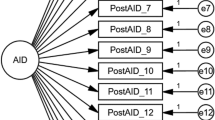Abstract
Indigenous aid workers carry out the majority of humanitarian aid work, yet there is little empirical information available on their support needs in different contexts. Focus groups (N = 26: Study 1) and a survey (N = 137; Study 2) were conducted with Guatemalan aid workers to explore their exposure to violence, posttraumatic stress symptoms, burnout, support needs, and motivators. Participants reported experiencing an average of 13 events of community violence and 17% reported symptoms consistent with posttraumatic stress disorder (PTSD). Direct community violence exposure and levels of emotional exhaustion were positively related to PTSD symptoms, while levels of personal accomplishment were inversely related to PTSD symptoms. Expressed support needs, motivators and rewards for aid work in the face of adversity are also reported as potential protective factors for further exploration. Implications for training and support of aid workers in similar contexts are also suggested.
Similar content being viewed by others
References
Alexander, D., & Klein, S. (2001). Ambulance personnel and critical incidents: Impact of accident and emergency work on mental health and emotional well-being. British Journal of Psychiatry, 178, 76–81.
Anckermann, S., Dominguez, M., Soto, N., Kjaerulf, F., Berliner, P., & Mikkelsen, E. N. (2005). Psycho-social support to large numbers of traumatized people in post-conflict societies: An approach to community development in Guatemala. Journal of Community & Applied Social Psychology, 15(2), 136–152.
Clary, E. G., Snyder, M., Ridge, R. D., Copeland, J., Stukas, A. A., Haugen, J., et al. (1998). Understanding and assessing the motivations of volunteers: A functional approach. Journal of Personality and Social Psychology, 74, 1516–1530.
Comas-Díaz, L., Lykes, M. B., & Alarcâon, R. D. (1998). Ethnic conflict and the psychology of liberation in Guatemala, Peru, and Puerto Rico. American Psychologist, 53(7), 778–792.
Eriksson, C. B., Vande Kemp, H., Gorsuch, R., Hoke, S., & Foy, D. W. (2001). Trauma exposure and PTSD symptoms in international relief and development personnel. Journal of Traumatic Stress, 14(1), 205–219.
Jenkins, E. J. (2002). Black women and community violence: Trauma, grief, and coping. Women & Therapy, 25(3–4), 29–44.
King, L. A., King, D. W., Leskin, G., & Foy, D. W. (1995). The Los Angeles symptom checklist: A self-report measure of Posttraumatic Stress Disorder. Assessment, 2(1), 1–17.
Maslach, C., Jackson, S. E., & Leiter, M. P. (1996). Maslach burnout inventory-human services survey (MBI-HSS). In C. Maslach, S. E. Jackson, & M. P. Leiter (Eds.), MBI manual (3rd ed.). Palo Alto, CA: Consulting Psychologists Press.
Mérida, G., & Mario, A. (2003). Análisis de la violencia: victimas y victimarios “La otro lectura”. In S. Wolford (Ed.), Psicología Social y Violencia Política (pp. 109–119). Ciudad de Guatemala: Equipo de Estudios Comnitarios y Acción Psicosocial (ECAP).
Omoto, A. M., & Synder, M. (1995). Sustained help without obligation: Motivation, longevity of service, and perceived attitude change among AIDS workers. Journal of Personality and Social Psychology, 4, 671–686.
Richters, J., & Saltzman, W. (1990). The survey of children’s exposure to community violence. Washington DC: National Institute of Mental Health.
Sabin, M., Lopes Cardozo, B., Nackerud, L., Kaiser, R., & Varese, L. (2003). Factors associated with poor mental health among Guatemalan refugees living in Mexico 20 years after civil conflict. JAMA: The Journal of the American Medical Association, 290(5), 635–642.
Schaefer, F. C., Blazer, D. G., Carr, K. M., Burchett, B., Schaefer, C. A., & Davidson, J. R. T. (2007). Traumatic events and posttraumatic stress in cross-cultural mission assignments. Journal of Traumatic Stress, 20, 529–539.
Stoddard, A. (2007). Increasing risk to aid workers? (Parts I & II). The Globalist, Article 5893. Retrieved April 3, 2008, from www.theglobalist.com/storyid.aspx?StoryId=5893.
Tróccoli, C. O. (2003). Cultura de la violencia. In S. Wolford (Ed.), Psicología Social y Violencia Política (pp. 265–274). Ciudad de Guatemala: Equipo de Estudios Comnitarios y Acción Psicosocial (ECAP).
Whealin, J. M., Ruzek, J., & Southwick, S. (2008). Cognitive behavioral theory and preparation for professionals at risk for trauma exposure. Trauma, Violence, and Abuse, 9, 100–113.
Author information
Authors and Affiliations
Corresponding author
Rights and permissions
About this article
Cite this article
Putman, K.M., Lantz, J.I., Townsend, C.L. et al. Exposure to Violence, Support Needs, Adjustment, and Motivators Among Guatemalan Humanitarian Aid Workers. Am J Community Psychol 44, 109–115 (2009). https://doi.org/10.1007/s10464-009-9249-5
Published:
Issue Date:
DOI: https://doi.org/10.1007/s10464-009-9249-5




